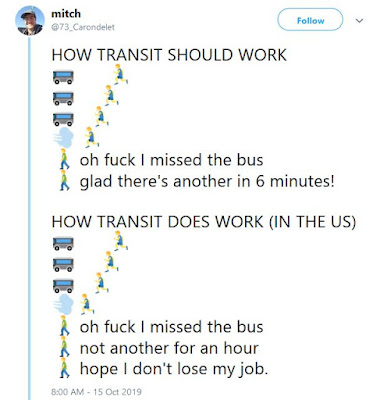 |
| Some ingredients to our autoism and carbon pollution, 53% of which comes from our cars (via VTPI, Salem notes added) |
 |
| This is probably bad framing |
Over at 350.org they've pointed to the City of Milwaukie's Climate Action Plan, and it highlights some good themes, though it may not yet be assertive enough. It's not a Comprehensive Plan, but the themes can be carried into it and direct its shape and specific policies.
Milwaukie Climate Plan:
- Implement the Safe Access for Everyone (SAFE) street and sidewalk improvement program to expand bike and pedestrian access
- Partner with Metro and TriMet to increase transit service, particularly to underserved employment areas
- Implement a Transportation Management Agency (TMA) with area partners
- Implement “electric vehicle ready” zoning regulations for commercial buildings and multifamily housing
- Incentivize employers to encourage active transportation and transit
- Continue to promote the purchase of sidewalk credits in areas outside of pedestrian corridors and redirect funds to areas needing this infrastructure
- Promote “neighborhood hubs” through Comprehensive Plan policies
- Implement parking pricing in downtown
- Implement variable system development charges to encourage accessory dwelling unit development
- Lower parking ratios near high capacity corridors
 |
| The benefits of frequent service. In many ways we need to center transit in our analysis via Twitter |
- Wednesday, October 16: 6-8 p.m., Pringle Hall, 606 Church St SE
- Thursday, October 17: 6-8 p.m., Crossler Middle School, 1155 Davis Rd S
- Friday, October 25 (in Spanish only, in collaboration with Enlace): 6-8 p.m., Chemeketa Community College, Building 8, 4000 Lancaster Drive NE
Then, at 7:30pm tonight, a lecture will focus on climate and offer a more general, higher altitude perspective. ("How do we lead with our hearts in our hands?" When our hands aren't on the steering wheel!)
Dr. Sarah Myhre will deliver this year’s Salem Peace Lecture. Her topic will be: “Living, Loving, and Loathing on a Hot and Finite Planet: the Path Towards Climate Leadership.”...
Climate change is often described as a crisis. But if it were a crisis, there would be a resolution and end to that crisis. Climate change in not a crisis inasmuch as it is a fundamental mutation in the physical, chemical, biological, and evolutionary identity of the planet. Our culture has barely begun to account for the scale and nature of the change we will negotiate. What does it mean to lead across this paradoxical and liminal time, in our families, our communities, our institutions, and our nation? And how do we lead with our humanity; with our hearts in our hands?....
The 30th annual Salem Peace Lecture will take place in Willamette University’s Hudson Hall, located in the Mary Stuart Rogers Music Center on the Willamette University campus, at 7:30 pm on Wednesday, October 16, 2018. As always, there is no charge.
 |
| From the 2019 Ann Niles Active Transportation Lecture at PSU/TREC (via Twitter) |
Postscript, October 21st
The City's published the workshop presentation and a 20-minute video presentation, and there's not a lot of new substance in it. Mostly it's about the mapping charette in small groups.
 |
| During the summer, trails, parks, and bike lanes were popular Slide from presentation |
We were so into Mixed Use, we had to do some trading of other stickers a few times.The neighborhood hub concept itself might be underpowered, though. Neighborhood scale businesses still need a greater number of potential customers nearby than single-family housing generally supports. We will need to look more closely at tension between the desire for spaced-out single-family residential districts and what will actually support a thriving business hub. The concept here offers a 65% increase. But that's going from like 5 homes per acre to 8 per acre. One common figure is that we need 10 to 20 per acre for truly walkable urbanism.
My special sticker interest was Neighborhood Hub, defined as "Mostly single-family homes with neighborhood scale businesses." It'd be great if every residential neighborhood had a restaurant, tavern, small grocery store, or such within easy walking distance.
 |
| Three of the stickers for the mapping charette. Is the bump from 200 to 330 homes actually enough for a hub? |



2 comments:
Added a couple of notes on the workshop presentation - which doesn't seem to have offered enough new material for an independent post.
Regarding that comment about the "ethics of driving," here's a twitter thread on the Sacred Heart Auto League. In it is a "Driver's Prayer." The Auto League was a mid-century thing and oriented to mindful driving.
Post a Comment